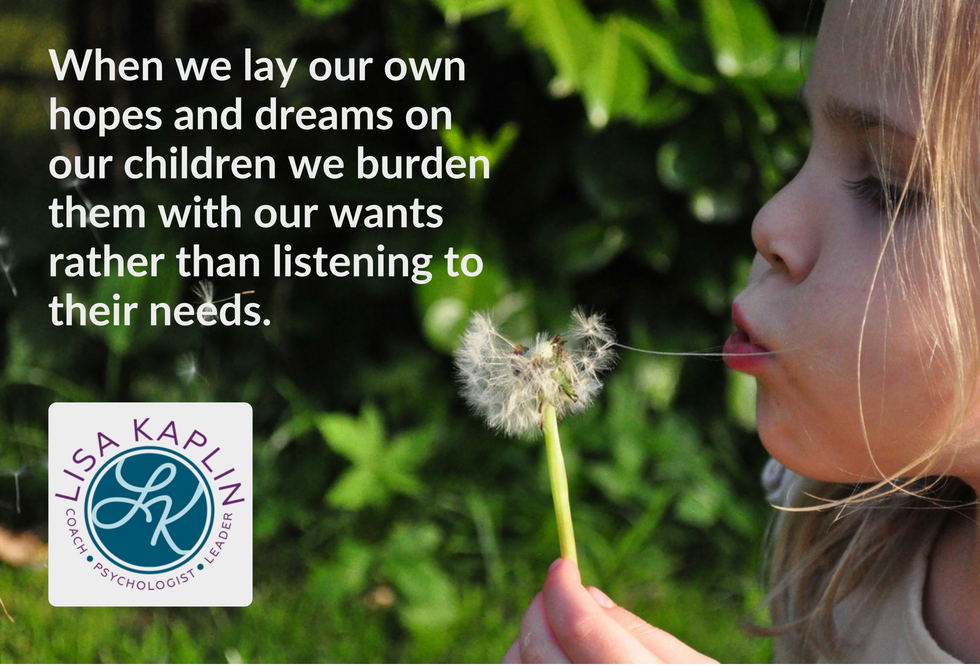This post was originally published in mindbodygreen on June 26, 2016.
***
We all have basic expectations of our children, such as good manners, following house rules, and meeting moderate academic requirements. That makes good sense and leads to relatively well-behaved children.
However, if our expectations of them are based on our own wishes for who they become and not in alignment with who our children really are, we could be setting ourselves up for some serious unhappiness, stress, and health struggles in our homes.
It starts out with comments such as, “I’m sure he’s going to be a straight-A student.” Or, “She’ll be a varsity athlete; everyone else in our family was.” Or, “Of course he’s not going to be an artist; there’s no money in that.” Or, “College isn’t optional, and she better know that right now.” And thus we set up a doom loop of misery for our child and ourselves.
The problem with parenting expectations
We all want what is best for our children. But why are we so sure that as parents we know what that is and that our children don’t? What if your child will find great joy in a modest-paying job in a field that they love versus a high-pressure but high-paying position in a field that they can’t stand? What if your child hates athletics but loves chess or even video games as a way to relax and take some time for themselves?
What if your child is an introvert and you were hoping for a fabulously social extrovert? Should you try to make them into the outgoing person you want them to be, or should you accept them as they are and guide them through the often challenging aspects of life as an introvert in a very extroverted world? What if your son wants to be a ballet dancer and your daughter wants to play rugby? Can you accept them and their interests even though they are different from yours?
If your answer is, “No, absolutely not,” I challenge you to reconsider. When we put our own expectations on children and they don’t meet those expectations, they feel like failures. They can see our disappointment and they either feel disappointment in themselves, or they lash out at us for our lack of acceptance. Neither leads to happy, healthy families or well-adjusted, successful children.
When I was a psychology intern at an inpatient mental health unit for adolescents, the children often confessed that their greatest pain was seeing the disappointment in their parents’ eyes. The disappointment wasn’t from them doing terrible things but rather from not being who their parents wanted them to be: the theater-loving young man whose father wanted him to be an athlete or the Ivy League parent whose child was content as a C-student. The pain that these children felt was tremendous. Their parents meant well, but they were hurting their children terribly.
When we put our expectations on children & they don’t meet them, they feel like failures. They feel disappointment in themselves or lash out at us for our lack of acceptance. Neither leads to healthy families or successful children. #parenting Click To TweetWhat to do instead
So, you want a peaceful home and you want happy successful children? Then consider dropping the expectations that are about you and not about them. Require respectful behavior, reasonable curfews, and other family basics and then let them figure out what they want to do with their lives. Remind yourself of your own journey and how it was most likely not a straight path to happiness and success. Then let your children do the same thing.
When we lay our own hopes and dreams on our children we burden them with our wants rather than listening to their needs. We force them to become people that they might not want to be, and that can lead to unhappiness, anxiety, and often depression. Is this the burden we want to saddle our children with? I’ve never met a parent who has said yes to that, but many parents just aren’t sure how to do it differently.
So, next time you are about to express an expectation for your kids that is about you and not about them, stop for just a minute and think about what you are about to do. Do you really want to subtly tell your child that you don’t accept them for who they are and what they love to do? If not, bite your tongue and listen to what your child has to say.
You may just learn something about yourself and this beautiful young person that you have been given the honor to guide into the adulthood that is right for them.
Love,

Lisa Kaplin Psy. D. PCC

